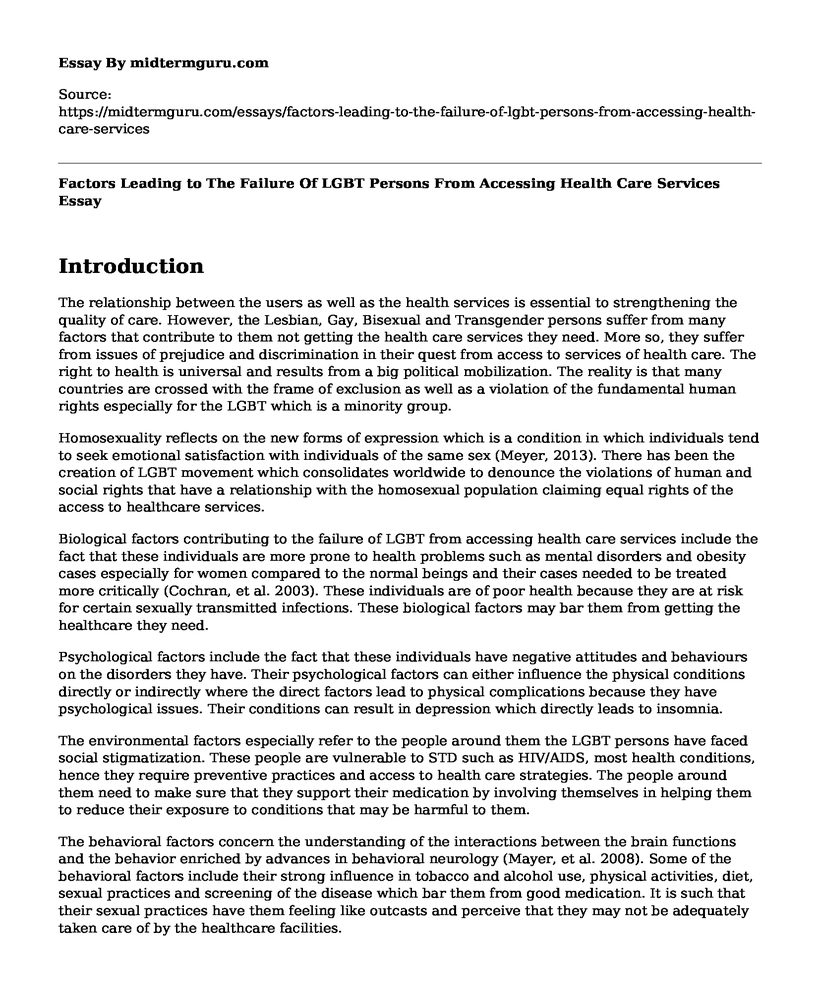Introduction
The relationship between the users as well as the health services is essential to strengthening the quality of care. However, the Lesbian, Gay, Bisexual and Transgender persons suffer from many factors that contribute to them not getting the health care services they need. More so, they suffer from issues of prejudice and discrimination in their quest from access to services of health care. The right to health is universal and results from a big political mobilization. The reality is that many countries are crossed with the frame of exclusion as well as a violation of the fundamental human rights especially for the LGBT which is a minority group.
Homosexuality reflects on the new forms of expression which is a condition in which individuals tend to seek emotional satisfaction with individuals of the same sex (Meyer, 2013). There has been the creation of LGBT movement which consolidates worldwide to denounce the violations of human and social rights that have a relationship with the homosexual population claiming equal rights of the access to healthcare services.
Biological factors contributing to the failure of LGBT from accessing health care services include the fact that these individuals are more prone to health problems such as mental disorders and obesity cases especially for women compared to the normal beings and their cases needed to be treated more critically (Cochran, et al. 2003). These individuals are of poor health because they are at risk for certain sexually transmitted infections. These biological factors may bar them from getting the healthcare they need.
Psychological factors include the fact that these individuals have negative attitudes and behaviours on the disorders they have. Their psychological factors can either influence the physical conditions directly or indirectly where the direct factors lead to physical complications because they have psychological issues. Their conditions can result in depression which directly leads to insomnia.
The environmental factors especially refer to the people around them the LGBT persons have faced social stigmatization. These people are vulnerable to STD such as HIV/AIDS, most health conditions, hence they require preventive practices and access to health care strategies. The people around them need to make sure that they support their medication by involving themselves in helping them to reduce their exposure to conditions that may be harmful to them.
The behavioral factors concern the understanding of the interactions between the brain functions and the behavior enriched by advances in behavioral neurology (Mayer, et al. 2008). Some of the behavioral factors include their strong influence in tobacco and alcohol use, physical activities, diet, sexual practices and screening of the disease which bar them from good medication. It is such that their sexual practices have them feeling like outcasts and perceive that they may not be adequately taken care of by the healthcare facilities.
The health system factors in the aspects of mortality, stage distribution and evaluations of patients may make the persons fear to seek medical attention (Addis, et al. 2009). They find it hard to explain their conditions to medical care providers. The associated treatment outcomes may affect these individuals because the approach may not be the expected one.
The socio-cultural factors also affect LGBT persons. These include the likes of aesthetics, education, their language, law and politics, religion, the social organizations, technology and the cultural values which may differ from the rest. Hence, their access to health care is limited.
References
Addis, S., Davies, M., Greene, G., MacBrideStewart, S., & Shepherd, M. (2009). The health, social care and housing needs of lesbian, gay, bisexual and transgender older people: a review of the literature. Health & social care in the community, 17(6), 647-658.
Cochran, S. D., Sullivan, J. G., & Mays, V. M. (2003). Prevalence of mental disorders, psychological distress, and mental health services use among lesbian, gay, and bisexual adults in the United States. Journal of consulting and clinical psychology, 71(1), 53.
Mayer, K. H., Bradford, J. B., Makadon, H. J., Stall, R., Goldhammer, H., & Landers, S. (2008). Sexual and gender minority health: what we know and what needs to be done. American journal of public health, 98(6), 989-995.
Meyer, I. H. (2013). Prejudice, social stress, and mental health in lesbian, gay, and bisexual populations: conceptual issues and research evidence.
Cite this page
Factors Leading to The Failure Of LGBT Persons From Accessing Health Care Services. (2022, Oct 14). Retrieved from https://midtermguru.com/essays/factors-leading-to-the-failure-of-lgbt-persons-from-accessing-health-care-services
If you are the original author of this essay and no longer wish to have it published on the midtermguru.com website, please click below to request its removal:
- Essay Sample on Drug Price Control
- Research Paper on Discrimination and Racism Against the Muslims
- Integumentary System: Skin, Sensors, Anatomy & Function - Essay Sample
- Affordable Healthcare for All: President Clinton's 1993 Plan - Essay Sample
- Employment Discrimination Lawsuits: What Businesses Can Do - Essay Sample
- Human Growth: From Conception to Fetal Stage - Essay Sample
- The History of Apartheid: Discrimination in 20th Century South Africa - Essay Sample







